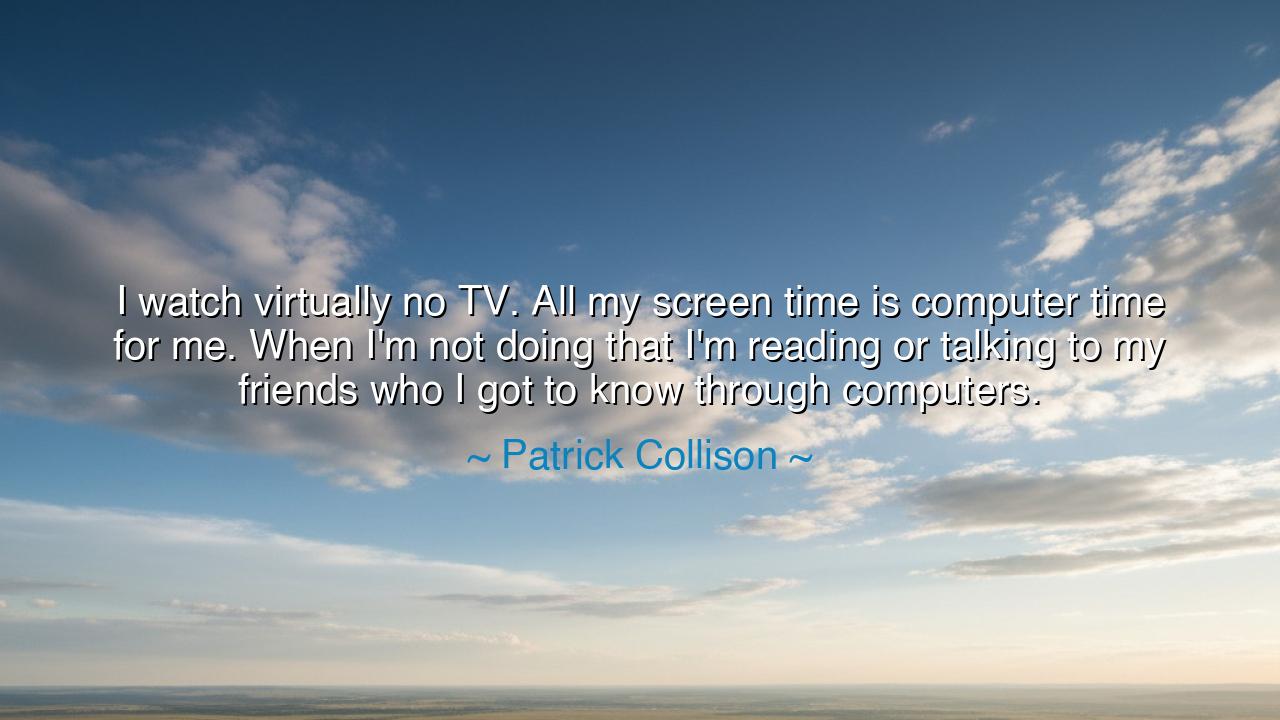
I watch virtually no TV. All my screen time is computer time for
I watch virtually no TV. All my screen time is computer time for me. When I'm not doing that I'm reading or talking to my friends who I got to know through computers.






In the words of Patrick Collison, “I watch virtually no TV. All my screen time is computer time for me. When I'm not doing that I'm reading or talking to my friends who I got to know through computers.” These words, spoken by one who has mastered the art of connection through the digital age, reflect a profound shift in how we engage with the world and with one another. They reveal an embrace of technology as a means to connect, learn, and grow, contrasting sharply with the old ways in which the television was the dominant medium for entertainment and information.
In days long past, storytelling was the means by which knowledge was passed down. Philosophers like Plato and Aristotle would gather their students in forums or walk along the Lyceum or the Academy, exchanging wisdom and ideas. In this sense, their gatherings were the equivalent of what Collison describes as “talking to friends.” The difference now, however, is the scale and the medium. The computer has become a gateway to not just friends, but a vast network of people, ideas, and opportunities—far beyond the boundaries of the physical world. This digital realm is where the modern mind has taken root, where ideas are birthed, debated, and nurtured.
If we return to the example of the ancient philosophers, we see a clear parallel. In a time without modern technology, Socrates might have said that the pursuit of knowledge must happen not in isolation, but in dialogue with others. He believed that learning was a communal act, and that true wisdom arose from the exchange of ideas among a diverse group of thinkers. In this sense, Collison echoes that sentiment: rather than spend time absorbing passive entertainment through the television, he seeks active engagement, whether through reading or through digital conversations that expand his mind and enrich his relationships.
Think of Socrates in the Agora, where he would engage in conversation with all manner of citizens, young and old, wealthy and poor. He did not sit in a room of silence waiting for inspiration to strike. Instead, he sought out those who would challenge him, who would push him to think more deeply. This is the power of discussion, of sharing experiences and learning from those who have different perspectives. In a similar way, Collison finds himself connected with friends who, like the philosophers of old, challenge him, inspire him, and shape his view of the world—only now, these friends are spread across the globe, united not by their proximity, but by the shared space of technology.
This leads us to consider the power of choice. In the ancient world, knowledge was often reserved for the few—the scholars, the priests, the rulers. Today, the digital age has democratized information, bringing knowledge and human connection to our fingertips. Yet, with this power comes responsibility. Collison’s choice to spend his time on the computer reading and engaging in meaningful conversations rather than passively consuming media is a choice many of us can learn from. In an age where distractions are limitless and the pull of entertainment is ever strong, it is an act of great intentionality to seek out conversations that foster growth, rather than mere escape.
Consider the wisdom of the ancient Stoics, who taught that our time is the most precious resource we have. Epictetus urged his followers to be mindful of how they spend their moments, for the path to virtue is paved by the wise use of one's attention. To be constantly distracted, to allow the noise of the world to drown out our inner thoughts and connections, is to squander the one thing we cannot reclaim: time. In this, Collison’s decision to invest his time in meaningful interactions is a reflection of a higher purpose—a commitment to shaping a life of purpose and growth rather than one of mediocrity and passivity.
The lesson here is one of mindfulness and purpose in how we engage with the tools at our disposal. Technology itself is neither good nor evil—it is what we choose to do with it that determines its value. Collison offers a model for us: choose engagement over distraction, connection over isolation, growth over stagnation. In a world where screens dominate our attention, let us remember that we are the masters of how we use them. Like the ancient philosophers, we too can build lives rich with knowledge, dialogue, and growth—whether it be in physical spaces or across the vast digital expanse.
To live wisely, we must recognize that time is not merely a commodity to be filled with entertainment or idle distraction, but a sacred gift to be spent on what truly matters. Seek out those conversations that challenge you, that nourish your soul, and that expand your understanding of the world. Use technology, but do so with intent. In this way, we may live more fully, and find meaning not in the noise of passive consumption, but in the wisdom and connection that arise from active engagement with the world around us.






AAdministratorAdministrator
Welcome, honored guests. Please leave a comment, we will respond soon